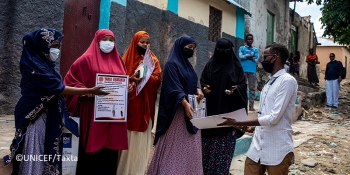
Advocacy and innovation in social service provision in Eastern and Southern Africa -
‘I am because we are’ - Strengthening social solidarity and global connectedness
*reposted with permission from UNICEF Eastern and Southern Africa
By Mohamed M. Malick Fall
Today, as we mark World Social Work Day, we celebrate the important impacts of social service workers on the lives of individuals, families and communities. This year’s theme of World Social Work Day is Ubuntu: ‘I am because we are’ – Strengthening Social Solidarity and Global Connectedness. The sentiment of Ubuntu, originating in South Africa, is one that resonates regionally.
Since the onset of the pandemic, containment measures have led to increased threats to children and women’s safety and well-being including gender-based violence, exploitation, abuse, neglect, and social exclusion. Children have been confined to their homes due to school closures and hidden from public sight. Stay-at-home orders and social distancing have cut children off from the support systems they need, especially when in distress, including school, extended family, community and social services. In this context, we rely on social service workers more than ever.
Despite significant challenges during COVID-19, social service workers for child protection have swiftly adapted how they provide essential services to ensure continuity of quality care. They have committed to maintaining social solidarity and connectedness in the communities where they work during this challenging time.
UNICEF, together with the Global Social Service Workforce Alliance, the International Federation of Social Workers, the Alliance for Child Protection in Humanitarian Action, and national associations and other groups, has supported efforts to strengthen the social service workforce for child protection. We have collectively advocated to governments, policy makers and other groups in Eastern and Southern Africa to ensure these workers are considered essential service providers during COVID-19, so they can be allowed to continue their work. To assess vulnerability, identify risks, carry out case management and deliver preventative services to protect all children, these workers frequently need to be able to conduct home and school visits.
In response to an August 2020 survey, 94 per cent of countries in Eastern and Southern Africa indicated that their countries had deemed social service workers as essential service providers, enabling them to continue in-person service delivery when necessary. Some examples of these in-person services included child protection, gender-based violence, mental health and psychosocial support, family re-integration or other home visiting programmes as part of case management and assessment for at-risk or highly vulnerable circumstances.
In Malawi, the National Association of Social Workers and UNICEF worked closely with the Ministry of Population Planning and Social Welfare, related ministries and partner organizations to ensure continuity of social services to vulnerable population groups. In Lesotho among many others in the region, social workers, probation officers and community development officers were among the workers deemed essential. The South African government showed remarkable readiness for social workers, child youth care workers and other social service professionals that were assigned as essential workers under the disaster management legal framework prior to the pandemic. The Council for Social Service Professions with support from UNICEF ensured they were immediately operational and equipped with necessary skills including psychosocial support. Successful advocacy efforts by UNICEF Uganda, the National Association of Social Workers in Uganda and other partners resulted in the reopening of the national Child Helpline and official recognition of social service workers as essential in the early days of the pandemic. As a result, these workers will be prioritized as the COVID-19 vaccine is rolled out in Uganda.
The COVID-19 pandemic has also highlighted gaps in social service provision in countries all around the world. In many countries throughout Eastern and Southern Africa, the social service workforce already faced budget and staffing constraints that were stretched even further with increasing reports of child protection risks, family separation, gender-based violence, and mental health and psychosocial support needs.
With the support of UNICEF at all levels, progress was made at national and regional level to recognize the essential role of the social service workforce. UNICEF stepped in to assist in service continuity and adaptation of tools to support the workforce in meeting both existing and emerging community needs.
In some countries, this support and advocacy enabled additional funding for hiring more workers, training volunteers or task-shifting workers’ responsibilities to ensure continuity of social services.
For example, in Kenya, with UNICEF support, more than 450 child protection workers from all 47 counties were trained on various topics related to child protection with a lens of COVID-19. The 12 series of webinars provided knowledge on emerging child protection risks and skills required to provide protection and case management services remotely.
The UNICEF Ethiopia Country Office, working with the Ministry of Women, Children and Youth, facilitated the review of the National Case Management Framework tools in response to COVID-19, adding remote case management and remote child protection services provision. Additionally, the Ministry, with financial and technical support from UNICEF, has been facilitating on-the-job training of more than 1,400 ministry officials and deployment of an additional 1,226 social service workers. These workers have been deployed to support case management including family tracing and reunification of returning migrant children and to facilitate COVID-19 prevention messages and the dissemination of mental health and psychosocial support messages at community level.
The Social Workers’ Association of Zambia worked in partnership with UNICEF and the government Ministry of Community Development and Social Welfare to implement a community-based case management system that relies on para-social work volunteers and was implemented across 17 districts. A packet of minimum standards was developed with UNICEF and the Ministry is assisting NGOs to implement them as they support community-based case management systems in the districts in which they operate.
Also in Zambia, UNICEF provided support to the Ministry to establish real-time data management platforms for remote case management for children living in alternative care and children in households affected by multiple vulnerabilities. UNICEF also supported the national Child Helpline to recruit 17 additional phone counsellors to provide psychosocial support to children, including those in a refugee settlement.
 In Somalia, a UNICEF survey conducted in July of child protection partners suggested that many children were not following physical distancing rules, there had been a rise in child protection violations and gender-based violence incidents, and the economic consequences of the lockdown were causing increased stress, anxiety and compounding high levels of vulnerability. Partners also reported a decreased ability to implement and monitor critical services and programmes. To respond to these new challenges, UNICEF supported the rapid training and deployment of 235 student social workers for a three-month period to work within government, district and civil society structures to provide a range of services to vulnerable women and children. These students have two-year bachelor-level social work training and received a short, one-week training on activities they were to undertake during their secondment period, to supplement the two years of bachelor-level work they had completed.
In Somalia, a UNICEF survey conducted in July of child protection partners suggested that many children were not following physical distancing rules, there had been a rise in child protection violations and gender-based violence incidents, and the economic consequences of the lockdown were causing increased stress, anxiety and compounding high levels of vulnerability. Partners also reported a decreased ability to implement and monitor critical services and programmes. To respond to these new challenges, UNICEF supported the rapid training and deployment of 235 student social workers for a three-month period to work within government, district and civil society structures to provide a range of services to vulnerable women and children. These students have two-year bachelor-level social work training and received a short, one-week training on activities they were to undertake during their secondment period, to supplement the two years of bachelor-level work they had completed.
In Eswatini, UNICEF supported the training of 70 social workers on child protection during COVID-19; the adaptation of response protocols; and the strengthening of child-related data. UNICEF also procured and distributed 70 tablets for social workers to strengthen social services during the pandemic. These were used to support the continuity of services, virtual trainings on case management during COVID-19, rapid assessments, and the broader social work mandate.
UNICEF supported the Department of Social Welfare in Eswatini to train and place 40 social work interns in quarantine facilities and to deploy additional case management officers to support district social welfare offices. Workers were provided with mobile data and voice bundles to ensure continuity of remote services. An awareness package was developed on the adaptation of Eswatini case management protocols during COVID-19.
In Malawi, police and social welfare officers have been at the forefront of handling gender- based violence, which has increased during the pandemic. Through increased collaboration, they have been providing a range of services and interventions to support those affected.
A number of countries in the region, including Kenya, Malawi, Tanzania, Uganda and Zambia have begun drafting legislation to recognize social work as a profession.
Our early advocacy efforts are now also resulting in this workforce being prioritized in many countries to receive a vaccine when they arrive in the region through COVAX. The COVAX Facility’s role is to continually watch the development of COVID-19 vaccines to identify the most suitable vaccine candidates. In Angola, Botswana, Ethiopia, Malawi, Namibia, South Africa, Uganda and Zambia they are being considered essential workers to receive the vaccination either alongside or immediately following frontline health workers. In doing so, governments are recognizing the essential role of these workers while helping to keep them and the individuals and communities they serve safe.
What we have learned from COVID-19 and prior health emergencies is that we cannot wait for the next epidemic to plan, develop and support the social service workforce. Increases in gender-based violence, children’s rights violations and mental health needs, among so many other social justice and equity issues resulting from COVID-19, will not go away on their own. We need the right numbers of workers with the right training in the right place at the right time to protect children, families and communities.
On World Social Work Day, we urgently call on all governments and partners to act now to strengthen this workforce to be best positioned and prepared both to tackle today’s needs and to mitigate future emergencies.
